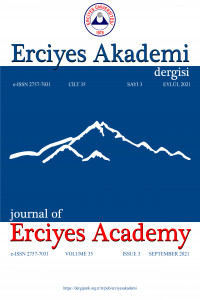Abstract
Keywords
intellectual emancipation equality egaliterianism hierarchy explaining teacher education social reality
References
- Descartes, R. (2013). Yöntem Üzerine Konuşma. (Çev. Ç. Dürüşken). Kabalcı Yayınları.
- Dinçer, E. H. (2018). Rancière, Düşünme, Eğitim ve Demokrasi Nefreti. Eğitim Bilim Toplum Dergisi, 16(61), 152-168.
- Duman, M. (2021). Özgürlüğün anlamı: felsefi bir soruşturma. Küre Yayınları.
- Ekinci, Ö. (2020). Jacques Rancière’de Entellketüelin İşlevinin Sorgulanması: “Cahil Hoca” Okulda. Asia Minor Studies: International Journal of Social Sciences, 8(2), 543-554.
- Encylopedia Britannica. (1911). Jean-Joseph Jacotot. (Ed. Hugh Chisholm). https://en.wikisource.org/wiki/1911_Encyclop%C3%A6dia_Britannica/Jacotot,_Joseph
- Esgün, T. G. (2012). Jacques Rancière’de Siyasetin Olanağı ve Demokrasi. Felsefe Arkivi, 36(1), 17-28.
- Freire, P. (1970). Pedagogy of the Oppressed. (Çev. R. Bergman and M. Bergman). Herder and Herder.
- Hegel, G. W. F. (1977). Phenomenology of Spirit. (Çev. A. V. Miller). Oxford University Press.
- Hollingshead-Strick, C. (2017). The Emancipated Spectator and Modernism. (Ed. Patrick M. Bray). Bloomsbury.
- Jaspers, K. (1932). Philosophie, Cilt 2, Berlin: Springer (3 cilt).
- Cusa, N. (1985). On Learned Ignorance. (Çev. Jasper Hopkins). Banning Press.
- Platon. (2004). Republic. (Çev. C. D. C. Reeve). Hackett Publishing.
- Platon. (1981). Five Dialogues. (Çev. G. M. A. Grube). Hackett Publishing.
- Rancière, J. (1973). On the Theory of Ideology: The Politics of Althusser. Radical Philosophy. Spring 1974. Erişim: https://www.radicalphilosophy.com/article/on-the-theory-of-ideology
- Rancière, J. (2014). Cahil Hoca: Zihinsel Özgürleşme Üstüne Beş Ders. (Çev. Savaş Kılıç). Metis Yayınları.
- Rancière, J. (1991). Ignorant Schoolmaster: Five Lessons in İntellectual Emancipation. (Çev. Kristin Ross). Stanford University Press.
- Rancière, J. (2009). Özgürleşen Seyirci. (Çev. E. Burak Şaman). Metis Yayınları.
- Türk, D. (2016). Eşitlik, Özgürlük, Otorite: Arendt ve Rancière’i Karşılıklı Düşünmek. Mülkiye Dergisi, 40(3), 87-114.
Abstract
Keywords
zihinsel özgürleşme eşitlik eşitlikçilik hiyerarşi açıklayıcı öğretmen eğitim toplumsal realite
References
- Descartes, R. (2013). Yöntem Üzerine Konuşma. (Çev. Ç. Dürüşken). Kabalcı Yayınları.
- Dinçer, E. H. (2018). Rancière, Düşünme, Eğitim ve Demokrasi Nefreti. Eğitim Bilim Toplum Dergisi, 16(61), 152-168.
- Duman, M. (2021). Özgürlüğün anlamı: felsefi bir soruşturma. Küre Yayınları.
- Ekinci, Ö. (2020). Jacques Rancière’de Entellketüelin İşlevinin Sorgulanması: “Cahil Hoca” Okulda. Asia Minor Studies: International Journal of Social Sciences, 8(2), 543-554.
- Encylopedia Britannica. (1911). Jean-Joseph Jacotot. (Ed. Hugh Chisholm). https://en.wikisource.org/wiki/1911_Encyclop%C3%A6dia_Britannica/Jacotot,_Joseph
- Esgün, T. G. (2012). Jacques Rancière’de Siyasetin Olanağı ve Demokrasi. Felsefe Arkivi, 36(1), 17-28.
- Freire, P. (1970). Pedagogy of the Oppressed. (Çev. R. Bergman and M. Bergman). Herder and Herder.
- Hegel, G. W. F. (1977). Phenomenology of Spirit. (Çev. A. V. Miller). Oxford University Press.
- Hollingshead-Strick, C. (2017). The Emancipated Spectator and Modernism. (Ed. Patrick M. Bray). Bloomsbury.
- Jaspers, K. (1932). Philosophie, Cilt 2, Berlin: Springer (3 cilt).
- Cusa, N. (1985). On Learned Ignorance. (Çev. Jasper Hopkins). Banning Press.
- Platon. (2004). Republic. (Çev. C. D. C. Reeve). Hackett Publishing.
- Platon. (1981). Five Dialogues. (Çev. G. M. A. Grube). Hackett Publishing.
- Rancière, J. (1973). On the Theory of Ideology: The Politics of Althusser. Radical Philosophy. Spring 1974. Erişim: https://www.radicalphilosophy.com/article/on-the-theory-of-ideology
- Rancière, J. (2014). Cahil Hoca: Zihinsel Özgürleşme Üstüne Beş Ders. (Çev. Savaş Kılıç). Metis Yayınları.
- Rancière, J. (1991). Ignorant Schoolmaster: Five Lessons in İntellectual Emancipation. (Çev. Kristin Ross). Stanford University Press.
- Rancière, J. (2009). Özgürleşen Seyirci. (Çev. E. Burak Şaman). Metis Yayınları.
- Türk, D. (2016). Eşitlik, Özgürlük, Otorite: Arendt ve Rancière’i Karşılıklı Düşünmek. Mülkiye Dergisi, 40(3), 87-114.
Details
| Primary Language | Turkish |
|---|---|
| Journal Section | Articles |
| Authors | |
| Publication Date | September 30, 2021 |
| Submission Date | July 27, 2021 |
| Published in Issue | Year 2021 Volume: 35 Issue: 3 |
ERCİYES AKADEMİ | 2021 | erciyesakademi@erciyes.edu.tr Bu eser Creative Commons Atıf-Gayri Ticari-Türetilemez 4.0 Uluslararası Lisansı ile lisanslanmıştır.


